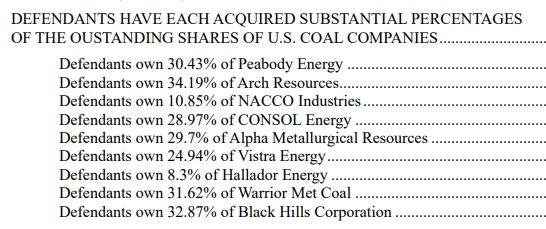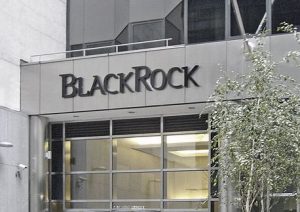By Jo Nova
Finally, a strike at the heart of the Blob
Texas and 10 other US States have pressed the radioactive Antitrust legal button and filed against BlackRock, Vanguard and State Street. The states claim the money managers bought up large stakes in coal companies and then colluded to promote ESG and DEI (diversity, equity and inclusion) goals that reduced coal output. The decreased supply of coal, in turn increased the cost of electricity to consumers. It was fundamentally anti-competitive behaviour. These three companies together have $26 Trillion dollars of assets under management. That’s only one trillion smaller than the entire US GDP.
In this case, some of the collusion hidden in clear view. The three money managers said they were trying to save the world and to protect the people, and they joined groups like the GFANZ and Net Zero alliances like Climate Action 100+. But in the end, these three financial giants had collectively acquired close to 30% of most US Coal companies, and even though they claimed to have good intentions, the 11 State Attorney Generals argue that any extraneous claims of social benefits are irrelevant. These three companies have profited immensely while customers have been denied access to a free and open market, and have paid higher electricity bills.
In a democracy, the people are supposed to decide the policies, not the Oligarchs.
Look at the grip the three supermassive money managers had on the coal industry:
No wonder coal companies were so pathetic at standing up for themselves, and fighting back against the climate propaganda. They were captured by the Blob and held hostage to larger goals:
BlackRock, Vanguard, State Street sued by Republican states over climate push
The defendants were accused of exploiting their market power and involvement in climate advocacy groups to pressure coal companies to slash output and reduce carbon emissions from coal by more than 50% by 2030, driving up consumers’ utility bills.
“Competitive markets — not the dictates of far-flung asset managers — should determine the price Americans pay for electricity,” the states said in the complaint.
Texas Attorney General Ken Paxton, whose office filed the lawsuit, in a statement accused the defendants of promoting an “illegal weaponization of the financial industry in service of a destructive, politicized ‘environmental’ agenda.”
The lawsuit aims to stop these companies from voting on shareholder resolutions or acting in a way to undermine coal output and competition. The Attorney Generals also want money — calling for fines to be paid for the antitrust violation.
From the legal suit:
The free market has been destroyed:
For the past four years, America’s coal producers have been responding not to the price signals of the free market, but to the commands of Larry Fink, BlackRock’s Chairman and CEO, and his fellow asset managers. As demand for the electricity Americans need to heat their homes and power their businesses has gone up, the supply of the coal used to generate that electricity has been artificially depressed—and the price has skyrocketed. Defendants have reaped the rewards of higher returns, higher fees, and higher profits, while American consumers have paid the price in higher utility bills and higher costs.
The three financial giants have violated the Clayton Act (Antitrust legislation)
Defendants are three of the largest institutional investors in the world. Each Defendant has individually acquired substantial stockholdings in every significant publicly held coal producer in the United States. Each has thereby acquired the power to influence the policies of these competing companies and bring about a substantial lessening of competition in the markets for coal. And each has used its power to affect a substantial reduction in competition in coal markets. Considered alone and in isolation, each Defendant’s acquisition and use of producers has violated Section 7 of the Clayton Act.
… Defendants have immense influence over these companies on their own, but collectively Defendants possess a power to coerce management that is all but irresistible.
They have made their goals public
But Defendants have not just acted alone and in isolation. In 2021, they went further. In that year, Defendants each publicly announced their commitment to use their shares to pressure the management of all the portfolio companies in which they held assets to align with netzero goals. Those goals included reducing carbon emissions from coal by over 50%. Rather than individually wield their shareholdings to reduce coal output, therefore, Defendants effectively formed a syndicate and agreed to use their collective holdings of publicly traded coal companies to induce industry-wide output reductions.
And even though they have pulled out of these Net zero alliances, (or Monster Banker Clubs), that doesn’t change the fact that they did engage in anticompetitive behaviour and still continue to threaten the free market.
Pretending to save the world while profiting from collusion is not OK
Defendants have publicly defended their anticompetitive scheme with appeals to environmental stewardship. But acquiring shares of common stock, “the effect of which ‘may be substantially to lessen competition’ is not saved because, on some ultimate reckoning of social or economic debits and credits, it may be deemed beneficial.” … The nation’s antitrust laws “reflect a legislative judgment that ultimately competition will produce not only lower prices, but also better goods and services.” … Defendants’ belief that concern for the climate confers a license to suppress competition is “mistaken.
The antitrust laws don’t permit [the enforcers of America’s antitrust laws] to turn a blind eye to an illegal deal just because the parties commit to some unrelated social benefit.”1 Under the antitrust laws, full and open competition must dictate domestic coal production.
BlackRock has also deceived its own shareholders
Larry Fink the CEO of Blackrock, turned people’s pension funds into his own leftist activist machine. He told them he would maximize their gains, but instead he used their funds to promote his own profits and goals at their expense.
In addition to joining with the other two major institutional asset managers to bring about a reduction in the output of coal, Defendant BlackRock went further—actively deceiving investors about the nature of its funds. Rather than inform investors that it would use their shareholdings to advance climate goals, BlackRock consistently and uniformly represented its non-ESG funds would be dedicated solely to enhancing shareholder value. But as detailed below, BlackRock routinely violated its pledge to investors, using all its holdings to advance its climate goals and—as most relevant here—promote the objectives of its output-reduction syndicate.
The States that may save us all are Texas, Alabama, Arkansas, Indiana, Iowa, Kansas, Missouri, Montana, Nebraska, West Virginia, and Wyoming.
Other countries should be following suit, and looking hard at their own competition laws. We may not have antitrust laws, but most of the West have some kind of competition laws against cartels who misuse their market power.
Related:
The dark bubble: There’s a reason everything seems to be going off the rails simultaneously
- Winning: Antitrust laws slow down the climate plans of $130T monster cartel of UN and global bankers
- 19 US States fight back against BlackRock the Political Climate Police disguised as a Monster Investment Fund
- Well that explains everything: Bankers bullied Australia into Net Zero
Photo of BlackRock Office: Jim.henderson



